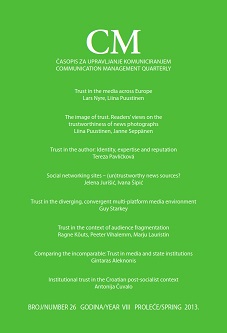Trust in the Diverging, Convergent Multi-Platform Media Environment
Trust in the Diverging, Convergent Multi-Platform Media Environment
Author(s): Guy StarkeySubject(s): Media studies, Social development, Management and complex organizations, Economic development
Published by: Fakultet političkih nauka Univerziteta u Beogradu
Keywords: trust; media; convergence; divergence; radio; television; newspapers; online; brand; audiences;
Summary/Abstract: Issues around trust and the media are becoming ever more acute as audiences in the developed world are faced with increasingly diverse sources of news and comment, which form part of a rapidly changing mediatised environment. Convergence promotes the consolidation and extension of strong and trusted brands across different platforms, yet those brands operate within increasingly competitive markets. In broadcasting, the old state monopolies and public/private duopolies were previously more easily operated and regulated than today, whereas now the internationalisation of content delivery means certain voices and platforms can be trusted more than others which have also become easily accessible. Print media benefited from self-regulation and economic gate keeping, in which only the most credible titles could be sustained by the market, whereas now almost anyone can self-publish online at little expense. However, the truthfulness and trustworthiness of even heritage media brands was rarely incontrovertible. For audiences, this period of rapid change can either be empowering or bewildering as they must develop skills in media literacy in order to become their own content editors, filtering out if they can from a cacophony of voices, those which can and cannot be trusted. This they often do, but frequently in a way that is brand led, rather than based on increased media literacy. The implications of what is often termed ‘progress’ for representation and for democracy are considerable. This paper uses evidence from the context of the United Kingdom to suggest ways in which audiences might be adapting to increased diversity of news sources. It also adds an important caveat to the notion of increasing plurality in the mainstream media: that institutional and economic forces have between them significantly eroded plurality through mergers and acquisitions in the traditional media industries whose main platforms remain print, television and radio.
Journal: CM Komunikacija i mediji
- Issue Year: 8/2013
- Issue No: 26
- Page Range: 73-97
- Page Count: 25
- Language: English

